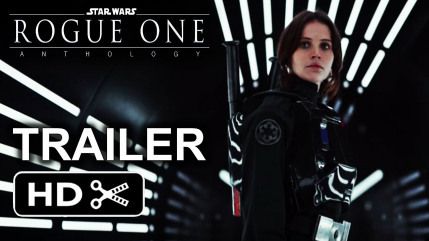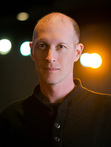The Generation of Anti-Heroes
With the release of the new teaser trailer for Rogue One, a Star Wars story, we are presented with Hollywood’s current trope: the anti-hero. If one looks up the anti-hero on Wikipedia, you will find an accurate description:
An antihero (or antiheroine) is a protagonist who lacks conventional heroic qualities such as idealism, courage, or morality. These individuals often possess dark personality traits such as disagreeableness, dishonesty, and aggressiveness. These characters are usually considered “conspicuously contrary to an archetypal hero”.

This is, I’m guessing, the essence of the character Jyn Erso, played by Felicity Jones, in as much as the trailer shows us. Specifically, we see this in her conversation with Mon Mothma, leader of the Rebel Alliance.
Mon Mothma: “On your own since age 15… Reckless, aggressive, and undisciplined.”
Jyn: “This is a rebellion, isn’t it? I rebel.”
Mon Mothma’s reaction is up for debate. Is it disappointment or sadness?
So, Star Wars, in Disney’s hands, is now taking its audience away from what made the original movie so classic. In other words, it is giving us not a new Luke Skywalker (archetypal hero) or Rey, but another Katniss Everdeen. We’re getting not an idealist who joined the rebellion out of a sense of rightness, but what appears to be an anti-authority felon who is sent on a potential suicide mission rather than be thrown in prison. An idealist would be a hero. The rebellion, apparently, needs an anti-hero.
Other film characters who are anti-heroes: Batman, Wolverine, James Bond, Han Solo (Episode IV only), Jack Sparrow, Riddick, and Mad Max. I’ve just hit the highlights; not even daring to touch the exhaustive number of anti-hero characters on television.
Now, even the villains are getting their own films, for example, Deadpool and Suicide Squad (consisting of the Joker, Harley Quinn, and other DC foes). If Heath Ledger survived, he would have been handed a three picture deal to play the Joker whether Batman appeared in the films or not. I would dare to even call Guardians of the Galaxy villains, since I found little appealing in the characters. (Is Rogue One simply Guardians of the Galaxy in the Star Wars universe?) Zack Snyder’s portrayal of Superman (in both Man of Steel and Batman vs. Superman) is dark, brooding, and only super in his powers and not his morality. In this instance, Snyder has converted Superman, arguably one of the greatest hero characters ever, into an anti-hero.
Disney has, so far, shied away from doing a Star Wars spin-off of the bounty-hunter Boba Fett, since, after all, how do you root for someone you know is inherently evil?
Simple: misdirection.
Our culture, upside down as it is, has the misguided answer, and it’s not much different from what we’ve seen so far: add humor to make the character likeable and then let his or her actions be detestable without apology. Everyone loves Captain Jack Sparrow because he is more of a cartoon character than a complex, real person. Never mind the original Pirates trilogy’s attempt to play up the “You are a good man” angle, since it has been thrown out of the sequels. Johnny Depp’s tangible charm makes Jack likeable. If Captain Jack was portrayed without humor, you would end up with a dark and manipulative, well, actual pirate. Picture Depp’s portrayal of “Whitey” Bulger in swashbuckling gear. Not very appealing, is it? Definitely not a role model.
But there is this very real technique that pervades our cultural mindset: if a person is likeable, how can they be wrong? In other words, a person must be right in their thinking and lifestyle choices simply because they have an appealing personality. This blind acceptance only plays to one’s emotions, which is at the core of good moviemaking. Effective filmmaking is at its core emotionally manipulative.
An ever increasing number of films are coming out which have an anti-hero as the protagonist. What does this do in shaping the perceptions of this next generation of moviegoers? What kind of person embraces the idea of a joke-cracking villain as a hero? How long will it be before the archetypal hero is portrayed as the destructive antagonist? We are moving as a whole, both in film and culture, into a realm where good is called evil, and evil, good.





